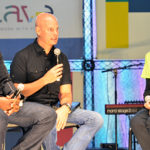Posted: 2/01/08
Ethnically diverse churches look
like God’s kingdom, speakers insist
By Sue H. Poss
CBF of South Carolina
ATLANTA—A Baptist church only resembles God’s kingdom when it includes the diversity of people created in his image, according to participants in a special interest session at the New Baptist Covenant celebration.
“Whenever we are in a room where everybody looks like us, we are not in a room that looks like the kingdom of God,” said Chuck Poole, pastor of Northminster Baptist Church, Jackson, Miss.
Poole spoke at a special interest session on “Race as a Continuing Challenge,” along with Joy Yee, senior pastor of Nineteenth Avenue Baptist Church in San Francisco and former moderator of the Cooperative Baptist Fellowship, and Denise Gillard, executive director of The HopeWorks Connection, Toronto, Ontario, Canada.
Cross-cultural experiences enrich churches by giving members a bigger perspective on God and the world.
| • See latest photos and the latest video clips from the New Baptist Covenant Meeting. (And go here to see our complete coverage of the event). |
Yee classified her church as “a church of the nations.” In addition to the English-speaking congregation, Nineteenth Avenue also includes congregations of Vietnamese, Cantonese-speaking Chinese, Japanese and Arabic ethnic groups. These congregations share space but worship separately in their own style. They come together for holiday services and other special events such as potluck suppers and seasonal festivals.
Recently, the have begun working together on international student ministry. “When you have a church that has all kinds of different people in it, your potential for ministry expands exponentially,” Yee said.
Gillard said that being in Christ is foundational to the way Christians relate to others.
“We are compelled to engage with each other,” she said. “Being in Christ provides us with an intersection and therefore can give us some courage.”
“As an Afro-Canadian, I need the courage to deal with the self-hatred of minority groups that want to be thought of as like the other group,” she said. “Our cultural heritage gives us our positions of forming assumptions about people. We need to ask the Holy Spirit to reveal and challenge the practices of subordination that we facilitate or permit in our churches. “
The church should take a more holistic, grassroots approach to dealing with the issue of race, Gillard said.
“There’s a lot of language couched in toleration, but toleration is not what Jesus called for,” she said. She suggested seminary students be required to experience cross-cultural placement and supervision to gain a better understanding of dealing with issues of race.
Poole spoke about his early life growing up in Macon, Ga., in the segregated South in the 1960s where he could not offer a seat on the bus to a black woman. He compared that experience to a wedding he performed 40 years later in Washington, D.C., where he was the only white person in the wedding party and all the participants were better educated than he.
Poole also said that early in his ministry while still a seminary student, a discussion of race relations in a deacons’ meeting turned to the Ku Klux Klan.
“To my everlasting shame and as a reflection of the world in which I was formed, I said the Klan is not such a bad thing,” he said. “And though you weren’t in the room, you’re the only people in this room, and I ask your forgiveness for that.”
Several years ago, Poole said he spoke in favor of the state of Mississippi removing the Confederate battle flag emblem from the state flag.
“I said that the gospel requires us to remove every symbol reflective of injustice and hatred,” he said. “I tell you that today to say that people can be born again and the spirit of God can transform lives.”
The panel offered some specific tips on how churches and individuals can deal with the challenges of race because, as Yee said, “Like attracts like, but … that is not what we are called to be.”
• Establish cross-cultural sister church relationships.
• Share stories and experiences.
• Be careful and thoughtful in speech and theology.
• Build Habitat houses together.
• Get involved in local schools and other places where youth gather.
• Learn how to say “hello” and “thank you” in another language.
• Create safe environments for discussion.
• Approach one another in humility. Put the interests of others first.
• Conduct self-examination to see if any walls exist.
• Start with small steps, such as building friendships in the workplace and neighborhood.
• Don’t be afraid.
• Don’t give up.
Some of the challenges that Yee said she has experienced in her “church of nations” ministry include:
• Overcoming a desire to hold onto one’s culture over participating in Christ’s culture.
• Competition arising among language groups.
• Bridging the gap between youth ministries conducted primarily in English and ministries. to older adults primarily in their native language.
• Autonomous congregations holding onto their own worship practices and theological distinctives while also trying to cooperate with other groups.
• Classifying and treating members of a particular group as being all the same.
• Guarding against racial/ethnic humor.
• Willingness to give up power and place trust in colleagues.
• Avoiding ethnocentric thinking.














We seek to connect God’s story and God’s people around the world. To learn more about God’s story, click here.
Send comments and feedback to Eric Black, our editor. For comments to be published, please specify “letter to the editor.” Maximum length for publication is 300 words.